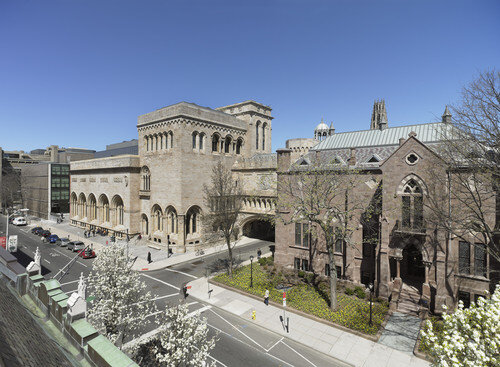On behalf of the Yale University Art Gallery, I want to affirm to you our collective belief in equality, inclusion, and racial justice for all Americans.
I write to acknowledge this harrowing time, a time when we are all grieving—personally and institutionally, as a community and as a nation—after having witnessed the brutal killing of George Floyd. Like you, I reacted to this news with sorrow, distress, and anger. Floyd’s murder follows the violent deaths of so many other Black Americans, including Ahmaud Arbery, Tony McDade, and Breonna Taylor, who have lost their lives in racist killings. These horrific events have rightfully ignited protests across the country and around the globe, as well as here in New Haven. As Yale President Peter Salovey wrote in his statement in memory of George Floyd, “All of us at Yale must do what we can to replace fear with hope—and not with anything less than action.”
On behalf of the Yale University Art Gallery, I want to affirm to you—our community and supporters—our collective belief in equality, inclusion, and racial justice for all Americans. We resolutely stand against racism, and we are appalled by the violence we continue to see in our communities against Black Americans, and against all others who experience persecution due to race, background, or beliefs.
We also recognize the extraordinary potential of a museum such as ours to more actively generate a new narrative, one that will help address racism and social inequities and lead to change. Gallery staff, Yale students and faculty, and our visitors have encountered this potential firsthand in recent exhibitions such as Place, Nations, Generations, Beings: 200 Years of Indigenous North American Art and Reckoning with “The Incident”: John Wilson’s Studies for a Lynching Mural. Through the artworks on view and accompanying programs, these exhibitions brought together multiple perspectives and created opportunities for open dialogue and exchange of ideas. This effort was aided by the new voices—students, scholars, and people of all backgrounds—who participated in the research, development, and creation of these shows. But these are just first steps. We know that more action is required.
The Gallery’s staff is currently engaged in the process of drafting a new five-year Strategic Plan, one that addresses our desire to assess the Gallery’s culture and priorities through its collections, operations, and staffing policies. This plan will ensure that the Gallery is a welcoming environment for all visitors. We will focus on inclusive interpretation and display of our collections and will continue to develop and present programs that are challenging and relevant to our times. Work on the draft plan has been greatly helped by the feedback and guidance of our Diversity, Equity, Inclusion, and Access (DEIA) Task Force created earlier this year, which includes staff from across the institution, as well as by a series of interviews held with members of the Yale community and colleagues from New Haven–based arts and cultural organizations, among others.
Through this work, we have begun to define new priorities for the museum, which include:
Learn and Mentor
— Fast-track proposed DEIA training and workshops for all Gallery staff, to take place as soon as we are allowed back on campus.
— Work with and hire DEIA experts to build a diverse staff.
— Increase mentorship of a new generation of art museum professionals, with particular support for those of diverse backgrounds.
— Learn from and strengthen partnerships with New Haven community organizations.
Include and Partner
— Newly activate our global collection to ensure inclusive interpretation and more cross-cultural display.
— Collaborate with cultural experts and others on interpretation and presentation, and establish teams with diverse viewpoints and expertise to participate in decision-making.
— Expand partnerships with New Haven–based organizations, including the NAACP, Black Lives Matter New Haven, and many others.
In this unprecedented time, we are heavyhearted to be apart, isolated, and unable to welcome all of you to the Gallery to experience the power that art has to not only heal but also provide a forum for reflecting upon and engaging in important and socially relevant conversations. We look forward to welcoming you back as soon as possible, and we aim to dedicate ourselves to the challenges we face and to supporting one another during this moment of anguish.
I, along with my colleagues, welcome your thoughts and proposals on how we as an institution can better create an environment where every person is treated with dignity and respect. Please contact me at yuagdirector@yale.edu.
Yours,
Stephanie Wiles
The Henry J. Heinz II Director
